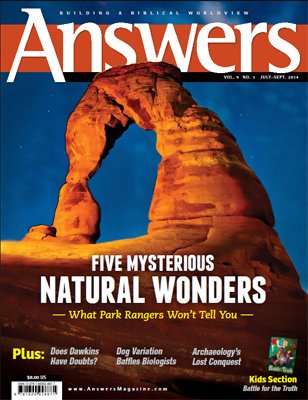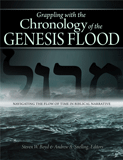Death Is Not Good
Biblical Authority
A vast number of conservative theologians accept animal death before Adam’s Fall. No significant doctrines are impacted, they say, if animals have been killing each other for millions of years.
Many pastors and theologians today believe that the earth is millions or billions of years old. But based on my reading and interactions, it is clear that most of them have never really considered the theological implications of allowing animal death, disease, predation, and extinction prior to Adam’s sin in the Garden of Eden.
Are you prepared to answer Christians who say the age of creation isn’t important?
When challenged about this seeming inconsistency, they usually point to the “overwhelming scientific evidence” and say or imply that their perspective is easy to harmonize with the Bible and it doesn’t significantly affect any important doctrines. This attitude is being promoted in theology textbooks widely used in conservative evangelical seminaries, colleges, and churches.
An example is Wayne Grudem’s Systematic Theology (1994). This work is helpful in many ways and immensely influential, having been translated into at least eight major languages. Like many other evangelicals who reject the young-earth view, Grudem believes that the Fall had an impact on the whole creation. And he teaches that when Jesus returns and renews the creation, “there will be no more thorns or thistles, no more floods or droughts, no more deserts or uninhabitable jungles, no more earthquakes or tornadoes, no more poisonous snakes or bees that sting or mushrooms that kill” (p. 836).
But this outstanding, highly respected theologian apparently does not see how the concept of millions of years of death before the Fall destroys the Bible’s teaching about the goodness of the original creation, the prospect of goodness in the new heaven and earth, and the goodness of God Himself.1 Are you prepared to answer Christians who say the age of creation isn’t important?
The Goodness of the Original Creation
As with any theological discussion, the place to begin is God’s Word. We all need to work hard to set aside our personal agendas and let Scripture inform us. When we examine Scripture closely, the timing of animal death directly impacts at least three critical doctrines.
The timing of animal death directly impacts at least three critical doctrines.
First is the goodness of the original creation. Genesis 1 says six times that during Creation Week God called the creation “good.” When He finished creating on Day Six, He called everything “very good” (Genesis 1:31). This weighty term is clearly chosen to emphasize “goodness,” a core concept of Scripture.
In creation’s initial “very good” state, God’s Word says that man, land animals, and birds were originally vegetarian (Genesis 1:29–30). Now we find creatures fossilized inside the stomachs of other creatures. So this carnivorous behavior must have occurred after the “very good” creation was cursed (Genesis 3).
Goodness Lost
Another key doctrine is the nature of the “goodness” lost at the Fall and needing restoration. Creation was once harmonious, but that is gone. Adam and Eve’s sin resulted in God’s judgment on the whole creation, not just man. The well-being of both is intimately linked throughout Scripture. Instantly Adam and Eve died spiritually; their relationship with God was broken (Genesis 3:8). They also became mortal so that their eventual physical death was certain (Genesis 3:19; Romans 5:12 and 1 Corinthians 15:21–22).
God’s judgment affected other aspects of creation. The serpent, which Satan used to deceive Eve, was cursed, resulting in a physical transformation of some kind, as it began to crawl on its belly (Genesis 3:14).
Since the verse says that the serpent was cursed “more than” or “above" all other animals,2 it is reasonable to assume that other animals could have been altered, either morphologically or at least behaviorally. Also, God cursed the ground itself, resulting in thorns and thistles (Genesis 3:17–18), a fact well remembered by Noah’s father (Genesis 5:29).
The Fall is the first of many examples where God judged (or threatened to judge) the non-human creation because of man’s sin: during the Flood (Genesis 6:13), as a result of Israel’s disobedience (Deuteronomy 28:15–68; 2 Chronicles 7:12–14), and as a consequence of Nineveh’s evil (Jonah 4:11).
In the New Testament, we see again this connection between mankind’s sin and redemption and nature’s corruption and liberation. With Adam’s Fall in mind (Romans 5:12), Paul tells us in Romans 8:19–25 that more than mankind was affected. The whole creation groans in slavery to corruption and futility, waiting for Christ’s final redemptive work at His Second Coming.
Scripture depicts this corruption as a bad thing, an imposition on the proper order of things. Yet those who believe that life has been around for hundreds of millions of years must believe what the evolutionists claim, namely that five major mass extinction events preceded mankind’s arrival on the planet. At each of those times, they say, 65–90 percent of all species on earth went extinct. If this is true, what impact did the Fall have on creation? None.
In fact, if death, disease, and extinction really did occur for millions of years, then the “very good” creation of Genesis 1 was considerably worse than the world we now inhabit. The Curse should actually be viewed as a blessing, since the earth has not seen 65–90 percent of all species go extinct since Adam sinned. In this scenario, the post-Fall world is more creature-friendly than the “very good” pre-Fall world! So to what state will Jesus “restore” the “groaning” creation in the future?
The Good Character of God
The acceptance of millions of years of animal death, disease, and extinction is also contrary to the nature of God revealed in Scripture.
The Lord claims to be good (Psalm 135:3) and takes responsibility for all of His creation. God’s description of His creative acts in Genesis 1 and Psalm 33:6–9 clearly shows that His acts were miraculous. God spoke and things immediately came into existence. God did not speak and then wait millions of years.
If millions of years of history occurred before man, we must ask why a good God would create some things miraculously and then allow millions of years of animal suffering, death, and extinction before creating other things miraculously.
God also claims that His works are good, just, and wise (Isaiah 46:9–11; Deuteronomy 32:4; Romans 11:33). What kind of God would create and then destroy billions of creatures that man would never be able to rule over, as God intended (Genesis 1:26–28)?
Only young-earth biblical creation gives us a view that is consistent with all the good attributes of God—His glory, wisdom, power, holiness, truthfulness, and omniscient intelligence—revealed throughout Scripture.
Restoring Goodness in Heaven and Earth
For the reasons above, our confidence in God’s promise to prepare a better place in the future depends on a better place—without animal death—having existed before Adam’s sin. At Christ’s return, He will complete His work of redemption. Acts 3:20–21 and Colossians 1:15–20 teach that He will “restore” and “redeem” all things to a similar but even better state than the pre-Fall world. Sin will be no more.
Regardless of our differences regarding the correct interpretation of Isaiah 11:6–9, the principle expressed there strongly implies that, when Christ restores the creation, animals will no longer eat each other. Human disease, suffering, and death will cease (Revelation 21:3–5) because the Curse will be no more (Revelation 22:3). The Curse came upon creation at Adam’s Fall and will be removed when the Last Adam consummates history.
The cosmic impact of Christ’s final redemptive work has been the orthodox Christian view for the last 2,000 years, and it needs to remain so.
The cosmic impact of Christ’s final redemptive work has been the orthodox Christian view for the last 2,000 years, and it needs to remain so.
As we have seen here, the idea of millions of years of animal death contradicts the Bible’s teaching about the nature of the pre-Fall creation and the present world. It also assaults the character of God. And it undermines the certain hope the Bible gives of Christ’s future redemptive work.
Could animals have died before the Fall? Absolutely not! To conclude otherwise is biblically unjustified and undermines a host of foundational doctrines, including the need for the gospel itself. Once this significance becomes clear, Christ-loving, Bible-believing Christians have only one choice: death—including death of animals—began after Adam’s Fall.3
Answers Magazine
July – September 2014
The summer issue looks at some of the earth’s most amazing rock features and explains how they formed quickly in the past few thousands of years.
Browse IssueFootnotes
- To understand the mistaken thinking of Grudem and others on this issue, see https://answersingenesis.org/age-of-the-earth/systematic-theology-texts-and-the-age-of-the-earth.
- The Hebrew word translated here “more than” (NKJV, NASB) or “above” (KJV, ESV, NIV) is used in Genesis 3:1; Genesis 37:3–4; Numbers 12:3; and 1 Kings 14:22 to indicate that one person or thing has a quality “to a greater degree than” some other person or thing.
- For a more in-depth discussion of this topic, see my article at https://answersingenesis.org/theory-of-evolution/millions-of-years/the-fall-and-the-problem-of-millions-of-years-of-natural-evil/.
Recommended Resources

Answers in Genesis is an apologetics ministry, dedicated to helping Christians defend their faith and proclaim the good news of Jesus Christ.
- Customer Service 800.778.3390
- Available Monday–Friday | 9 AM–5 PM ET
- © 2026 Answers in Genesis





